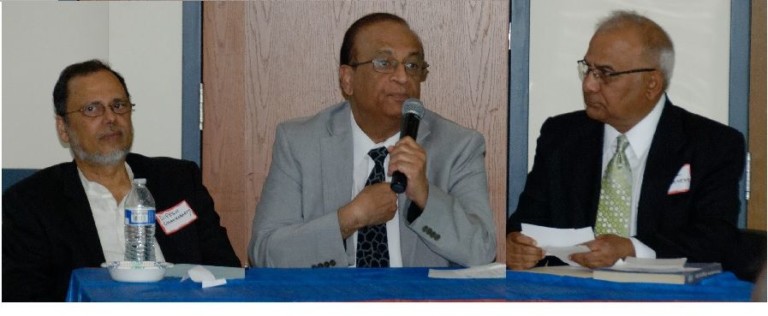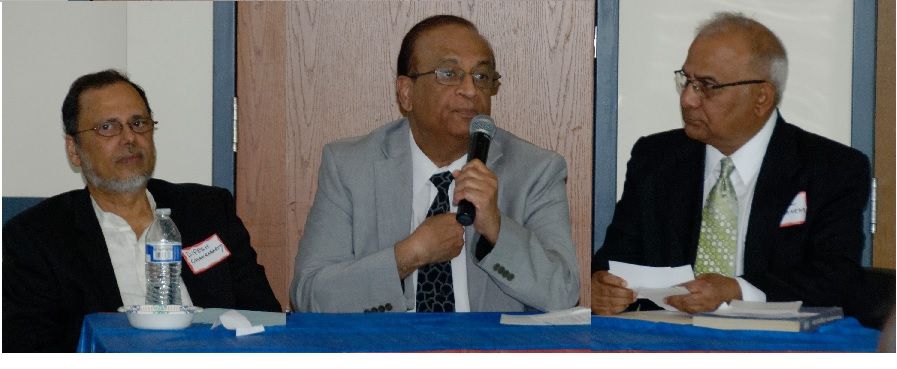
Elizabeth Chalier & Sunthar Visuvalingam
CHICAGO: The Building Bridges Group comprising expatriate Hindus, Muslims, Sikhs, Parsees, etc., increasingly concerned about the evolving state of community relations in their common land of origin, hosted a well-attended meeting September 30 at the Oakbrook Public Library to articulate a consensual “NRI vision for India” based on good governance, rule of law and inclusive development.
Its centerpiece and intended motor was a panel discussion—moderated by human rights activist for global minorities Dr. Rahul Deepankar—between community leader Dr. Bharat Barai, who had driven all the way from his home in Indianapolis, and University of Chicago history professor Dipesh Chakrabarty.
The discussion was framed by the comparison and contrast between constitutional versus actual protections for minorities in the two democracies: U.S. and India. Deepankar introduced the panel by recalling Benjamin Franklin’s 1787 consensual declaration that the U.S. would be “a republic, if you [the people] can keep it,” clearly implying that it was now at risk in India, despite constitutional safeguards.
Chakrabarty, who mostly confined himself to a neutral academic account of the evolution of Indian polity and governance from before Independence, illustrated the complex immensity of the challenges by fitting entire country population-wise into various states on a map of India.
Among his insightful observations was that Indira Gandhi had initiated dynastic governance that shared little, except in name, with the consensual Congress Party that had led and won the independence struggle. Whereas Hindutva leaders such as Sarvarkar were intellectuals attempting to persuade through their reasoned writings. Contemporary causes were descending to street-level confrontations mobilized by social media. Though the increasing incidents of violence remained small relative to India’s vast demographics, what matters in public discourse and lived reality is the legitimate, growing fear induced among vulnerable minorities.
Dr. Barai, who had read out PM Modi’s benedictory message at the inauguration here earlier the same month at the controversial World Hindu Congress, emphasized citizen responsibilities to balance rights-based civil agitation. Reaffirming his faith in the good sense and entrepreneurship of the electorate rather than over-reliance on government bureaucracy, he urged a constructive optimistic outlook in the face of all that India and its NRIs had achieved so far.
While acknowledging the disparities that had crept into Indian society and the need for empathetic remedial affirmative action, he argued that sporadic instances of violence were being blown out of proportion by a sensationalist and motivated media. He recounted his own unlikely success in having arrived in this land of opportunity with just a few dollars, eventually to be reappointed chairman of the medical licensing board of Indiana and longest serving member in all 50 states, despite his ‘colorful’ native accent and minority status, by dint of hard work.
The following Q&A offered a platform for minority constituencies to vent one-sided grievances against the Indian administration’s partisan or inadequate handling of ethnoreligious persecution, caste and gender oppression, and inconsistent application of constitutional safeguards. Instead of throwing probing questions at the two panelists to better sort out and carefully frame the difficult issues at stake, the moderator avoided pressing specific objections raised by Chakrabarty and audience members, which were left unanswered by Barai.
He instead invited a succession of noteworthy personalities to air their comments for one to two minutes at the podium. Given the complex diversity of Indian society and the crises generated by its transition to a globalizing (post) modernity, we were treated to a litany of communal grievances from all constituencies with no real solutions in sight. On the contrary, with repeated heckling from aggrieved Hindu and Muslim standpoints, the meeting ended on a sour note.
Despite invoking and promoting “the age-old Indian tradition of multiculturalism, pluralism, and harmony” (event flier) the shared, often implicit, conviction among NRIs leading the good life here seems to be that the U.S. offers the final yardstick to measure and evaluate community relations in their native land. Though the ‘secular humanism’ of the Western ‘Enlightenment’ has been a very recent introduction, the meeting began with appeals—for example by MC Imtiaz Uddin—to “our shared humanity” that is supposed to transcend the problematic religious identities that are still particularly strong across the subcontinent.
Hindu-Muslim conflict, for example, is a burdensome civilizational legacy that was not simply a motivated creation of British rule nor of the Sangh ideologues. Given the demographics, the long religious coexistence, peaceful day-to-day interaction, and even cultural (Indo-Islamic) co-creation over long centuries has been truly remarkable. Especially when contrasted to the Islamophobia so rampant across the West, and the serial destruction of sovereign Muslim societies by the U.S. in just the last 17 years, typically under the ‘humanitarian’ banner of the ‘right to protect’ (RTP).
Building bridges might be better served by hosting a series of less ambitious—hence more focused and probing—panels allowing all stakeholders to understand, appreciate and respond to the specific grievances of only one constituency at a time (e.g., Sikhs seeking justice for the 1984 riots), but from multiple perspectives. Removed from the passions afflicting their left-behind kinfolk, NRIs in Chicago, arguably the world’s most immigrant-friendly city, seem uniquely positioned to lead in exploring and combining best practices and attitudes from India and the U.S. towards an inclusive global future.
An amateur video of the entire event is accessible Click here, with more photos at Click here







